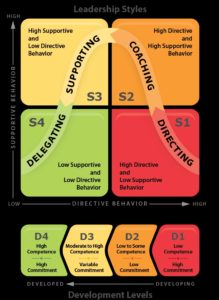 Situational Leadership
Situational Leadership
In last week’s post I explored three theories of leadership. My focus this week — Situational Leadership, from Paul Hersey and Kenneth Blanchard, — has been called by some the definitive leadership style. The Hersey-Blanchard model focuses on practical leadership development: the attributes and styles of the followers.
We are all different. We come from different backgrounds, cultures and have varying degrees of experience. We come to the workplace with different motivations and often with emotional baggage. As leaders we must not only be aware of our own motivation for doing things (our WHY) but also be open to understanding others. In my communications workshops I stress the need not only to understand our own STYLE of communication but even more importantly, to understand others’ STYLES and in fact, to move towards their style in our communication with them Communications experts call this “tailoring your message to your ‘target audience’.” Our role as leaders is to motivate and influence the followers, and you cannot do that if you don’t know their preferred style of communicating or their preferred leadership style.
The Situational Leadership model addresses four types of leadership styles, based on the follower:
- Directing
- Coaching
- Supporting
- Delegating
The goal is to develop followers to the Delegating level as seen in the chart:
“The Situational Leadership® Model provides leaders with an understanding of the relationship between an effective style of leadership and the level of readiness followers exhibit for a
specific task”. https://situational.com/
Situational Leadership: Directing
In the Situational Leadership Model, Directing is the initial or basic level of leadership style. Nearly all new employees need a more directive style of leadership. They are very formative with little or no experience in their new roles. In the formative stage the follower is characterized by low competence and high commitment, the inability to comply, with possible feelings of insecurity.
As a leader, we need to pay high attention to tasks, rather than to the relationship with the direct report, as a relationship does not yet exist.
When a direct report can’t do the job because they are unknowledgeable, the leader must spend much more time working with the employee, offering clear instructions and regular follow up. It’s all about encouraging and motivating at this point: celebrating positive results and offering suggestions and remedial actions for less positive results. The idea is to motivate the follower to rise to the next level of their ability.
This is a very leader-driven stage.
Situational Leadership: Coaching
Coaching is for followers who have developed some competence along with an improved commitment. The follower is not totally confident in their abilities but is getting there.
At this point the leader still needs to focus on tasks, which can still require significant commitment of time, but the focus can now expand to the developing relationship with the employee, building on the trust that has begun to develop and the encouragement that has been demonstrated. Again, the leader needs to spend significant time listening and offering advice.
The goal is to engage the follower so they can develop to the next level. There is less “telling” and more “suggesting,” which leads to more encouragement, acting as a coach. The recognition that they have progressed motivates them to progress even further.
This is still a very leader-driven stage.
Situational Leadership: Supporting
Supporting addresses the follower who is now competent at the job, but remains somewhat inconsistent and is not yet fully committed. The follower may be uncooperative or performing as little work as possible, despite their competence with the tasks.
The leader must participate with, and support the follower. The leader no longer needs to give detailed instructions nor to follow up as often, but does need to continue to check in to make sure that the work is being done at the required level.
The follower is now highly competent, but is not yet convinced in his or her ability or not fully committed to do their best and excel. The leader must now focus less on the tasks assigned and more on the relationships among the follower, the leader, and the group.
This is a very follower-driven, relationship-focused stage.
Situational Leadership: Delegating
The ultimate goal is Delegating: to create a follower who feels fully empowered and competent enough to take the ball and run with it, with minimal supervision. The follower is highly competent, highly committed, motivated, and empowered.
As a leader you can now delegate tasks to the follower and observe with minimal follow up, knowing that acceptable or even excellent results will be achieved. There is a low focus on tasks and a low focus on relationships. There is no need to compliment the follower on every task, although continued praise for outstanding performance must be given as appropriate.
This is a very follower-driven stage.
This is the second on a series specifically exploring what leadership is and how we can not only understand leadership but how to implement it
Leadership series directory:
https://johnkwhitehead.ca/three-theories-leadership/
Parts of this post were adapted from: Leadership and Influence, Global Courseware Inc.
________________________________________________________________________________________
John Whitehead, coaches’ individuals and organizations in becoming more effective by helping them improve their interpersonal communications, emotional intelligence and resiliency.
*******Are you wondering if having a Leadership/Personal Development Coach is right for you? Contact John for a complimentary, exploratory coaching session at [email protected]********
If you would like to get notifications for when I post, please go to my blog site and register. I promise I will not spam or use your email address for anything else. You can visit and register for my blog at https://johnkwhitehead.ca/blog-2/


Pingback: Leadership vs Management – Encourager! -